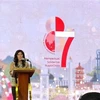UN special envoy Lynn Pascoe arrived in the Democratic People's Republic of Korea (DPRK) on February 9 on a four-day mission to try to revive long-stalled six-party nuclear disarmament talks.
Pascoe, UN chief Ban Ki-moon's top political adviser, is the highest-level UN official to visit the DPRK since 2004.
He said on arrival that his meetings would focus on enhancing cooperation between the DPRK and the United Nations.
He would hand over a letter from UN General Secretary Ban Ki-moon to the DPRK leadership and discuss a number of issues, including the nuclear programme and humanitarian aid.
The same day saw the DPRK’s top nuclear negotiator Kim Kye-Gwan fly to Beijing , just one day after Pyongyang expressed the willingness to resume talks on denuclearisation in exchange for food.
Analysts said the visit has signalled that six-party talks are likely to resume.
The visits followed a visit to the DPRK by the Head of the Department for Foreign Affairs of the Communist Party of China Central Committee, Wang Jiarui. In his meeting with Wang, the DPRK’s top leader, Kim Jong-il
reaffirmed his commitment in principle to denuclearisation and underscored the need to resume talks.
Chinese foreign ministry spokesman Ma Zhaoxu said in an interview that tensions over the nuclear situation on the Korean Peninsula are easing, creating a favourable atmosphere and conditions for the resumption of talks and denuclearisation.
He emphasised that the issue is complicated and sensitive, affecting the interests of several parties.
He called on all parties to step up their efforts, show flexibility, keep the dialogue going and create a favourable atmosphere and conditions for the resumption of the talks.
The DPRK abandoned the six-party negotiations, consisting of the US , Russia , Japan , China and the two Koreas , in 2009 to protest a UN condemnation of disputed missile launches by the DPRK./.
Pascoe, UN chief Ban Ki-moon's top political adviser, is the highest-level UN official to visit the DPRK since 2004.
He said on arrival that his meetings would focus on enhancing cooperation between the DPRK and the United Nations.
He would hand over a letter from UN General Secretary Ban Ki-moon to the DPRK leadership and discuss a number of issues, including the nuclear programme and humanitarian aid.
The same day saw the DPRK’s top nuclear negotiator Kim Kye-Gwan fly to Beijing , just one day after Pyongyang expressed the willingness to resume talks on denuclearisation in exchange for food.
Analysts said the visit has signalled that six-party talks are likely to resume.
The visits followed a visit to the DPRK by the Head of the Department for Foreign Affairs of the Communist Party of China Central Committee, Wang Jiarui. In his meeting with Wang, the DPRK’s top leader, Kim Jong-il
reaffirmed his commitment in principle to denuclearisation and underscored the need to resume talks.
Chinese foreign ministry spokesman Ma Zhaoxu said in an interview that tensions over the nuclear situation on the Korean Peninsula are easing, creating a favourable atmosphere and conditions for the resumption of talks and denuclearisation.
He emphasised that the issue is complicated and sensitive, affecting the interests of several parties.
He called on all parties to step up their efforts, show flexibility, keep the dialogue going and create a favourable atmosphere and conditions for the resumption of the talks.
The DPRK abandoned the six-party negotiations, consisting of the US , Russia , Japan , China and the two Koreas , in 2009 to protest a UN condemnation of disputed missile launches by the DPRK./.



















